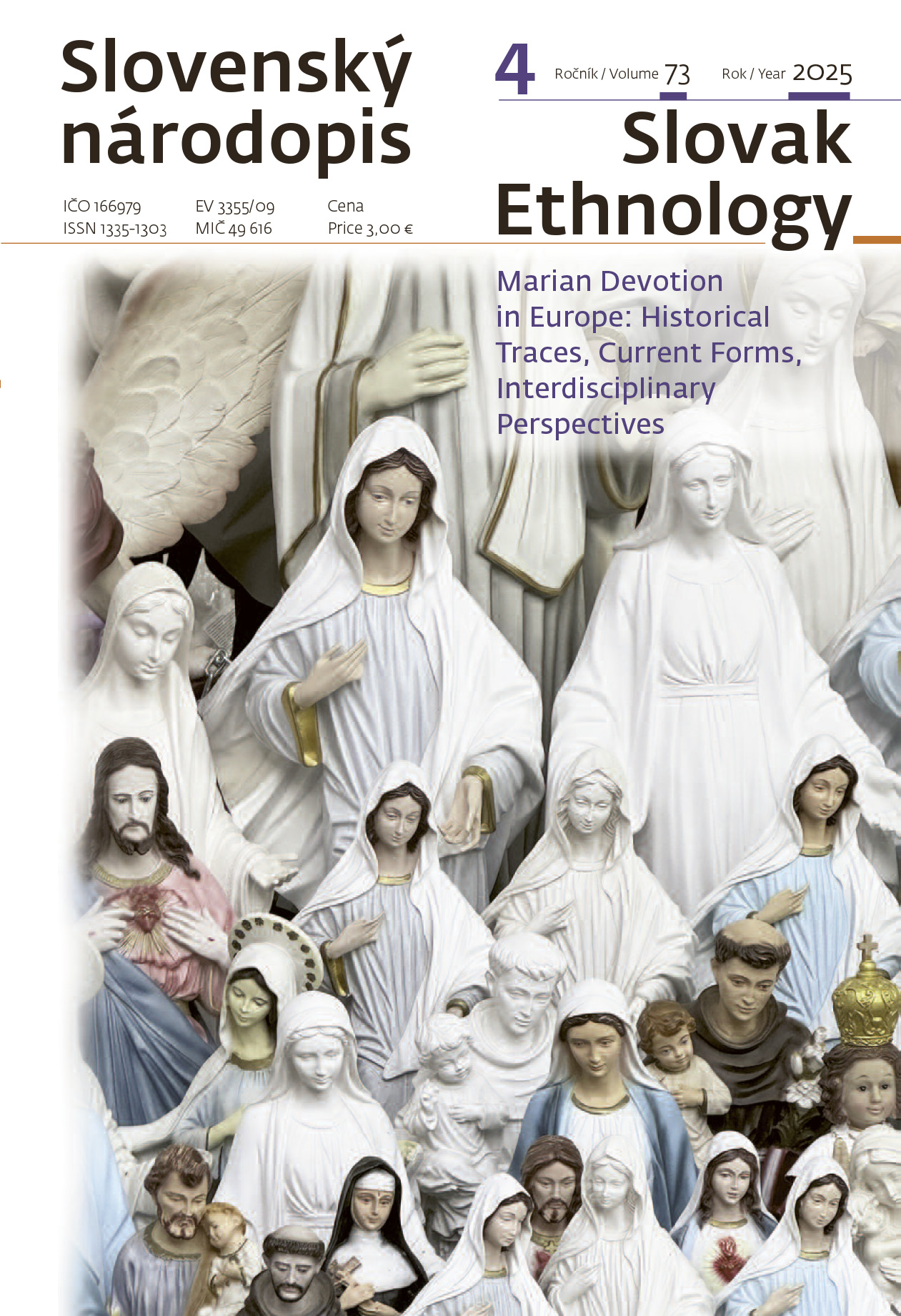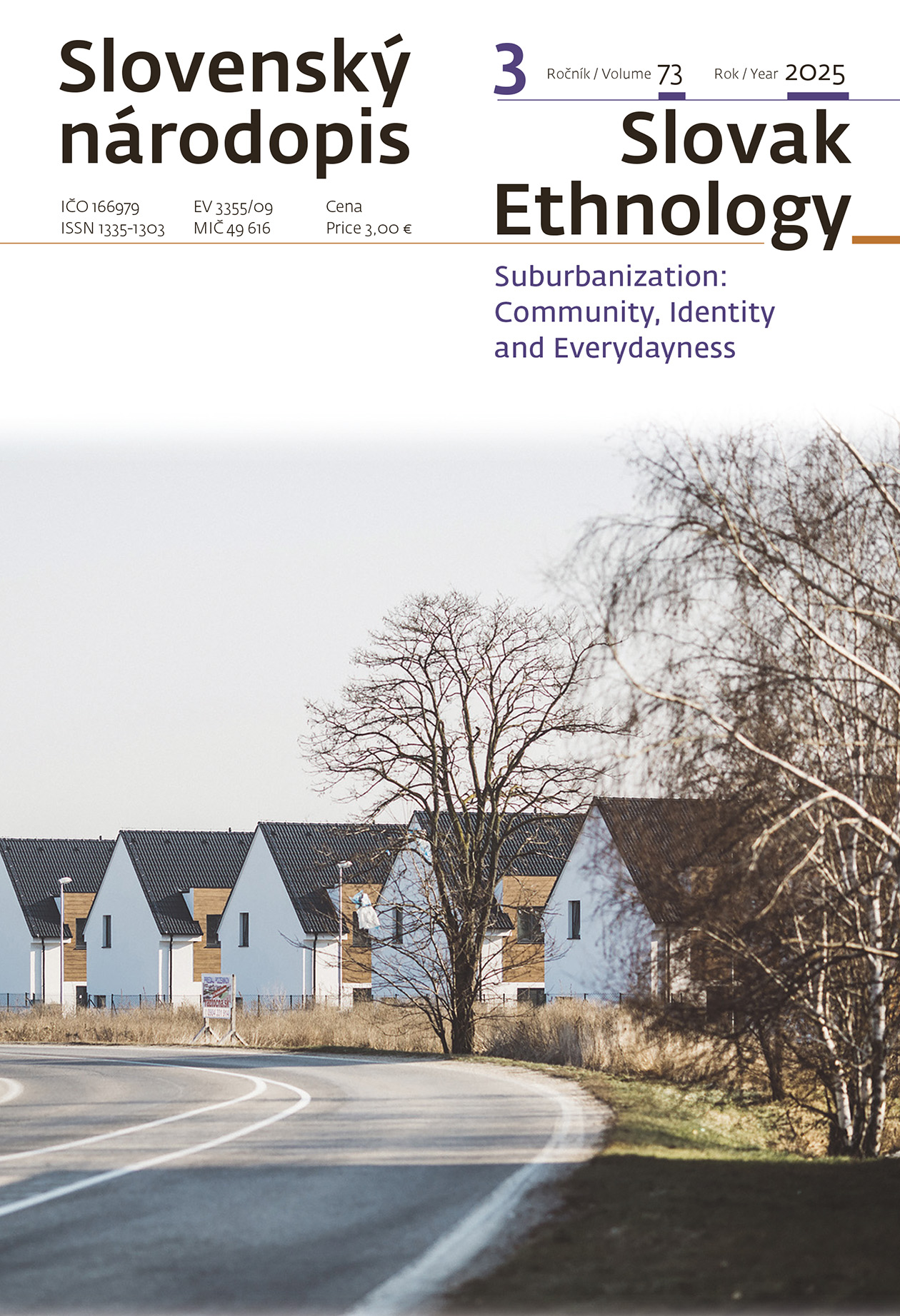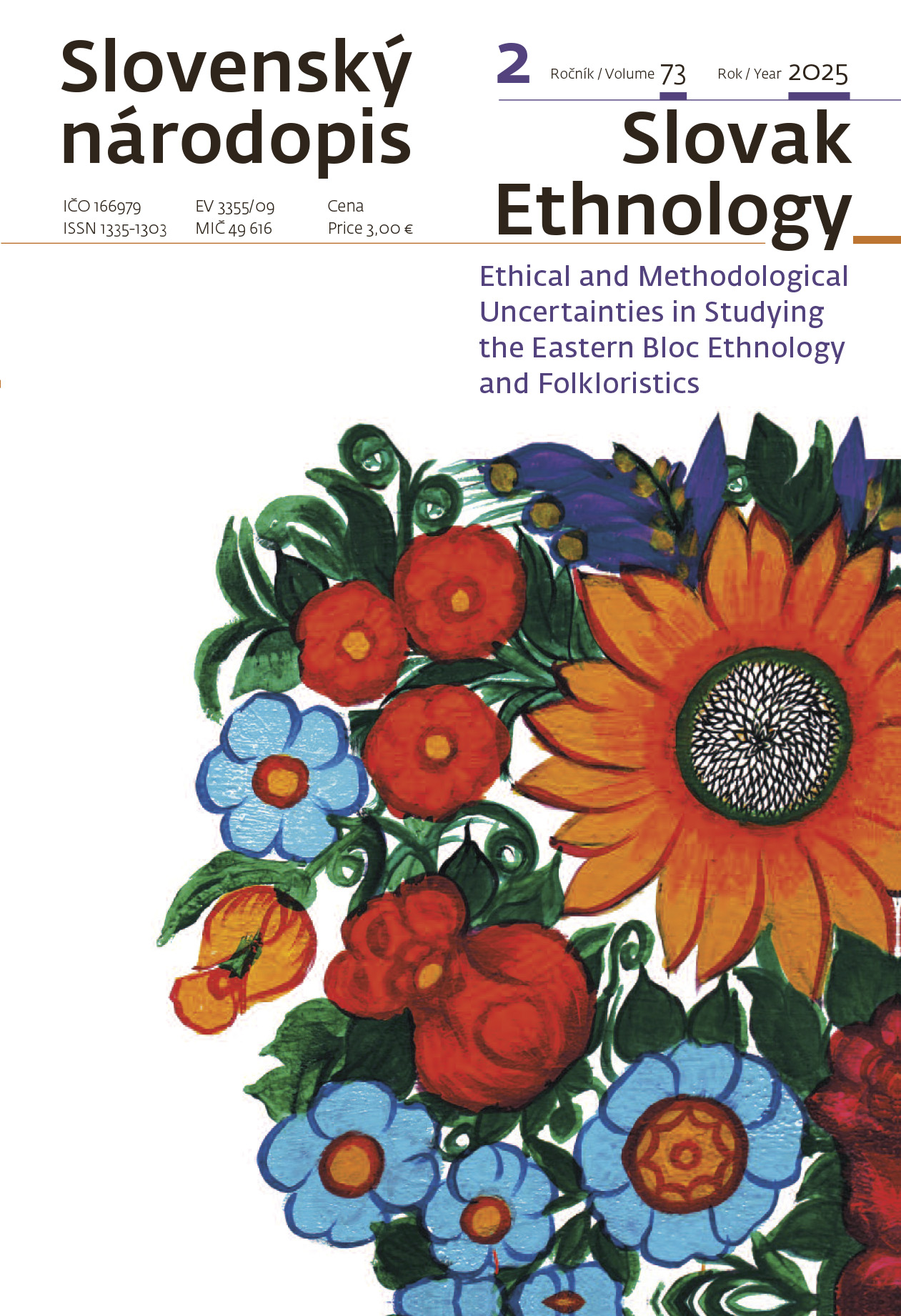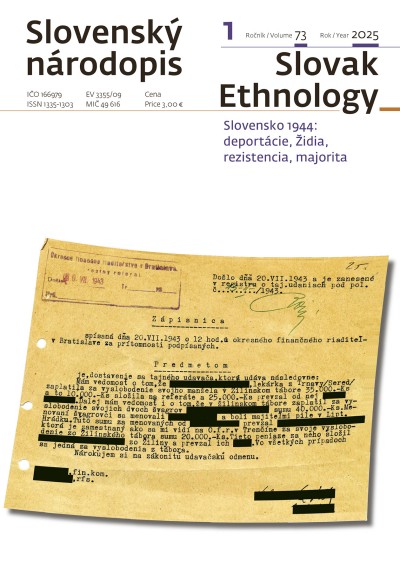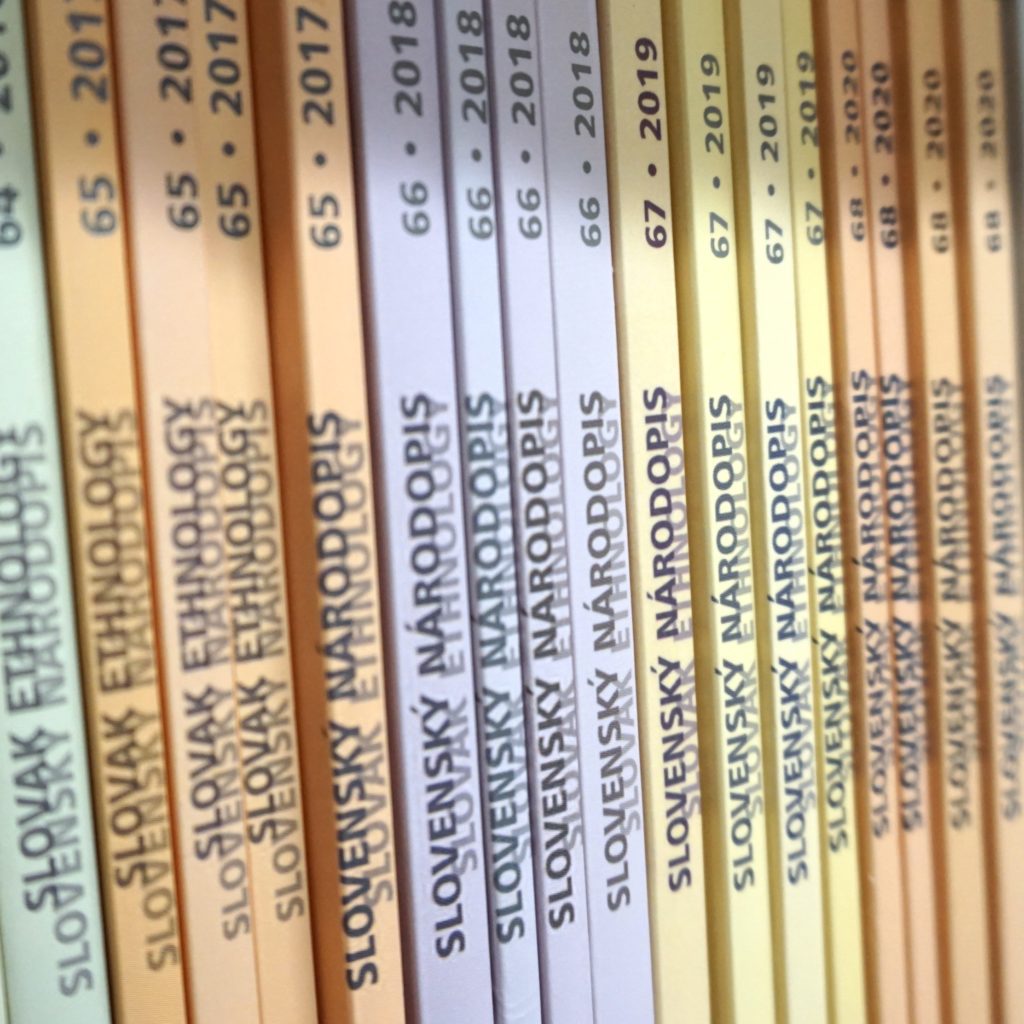
Slovak Ethnology
Publisher: Institute of Ethnology and Social Anthropology SAS
ISSN 1335-1303 (print)
ISSN 1339-9357 (online)
Contact
Slovak Ethnology Journal
Institute of Ethnology and Social Anthropology SAS
Klemensova 19
813 64 Bratislava
Tel.: 02 – 52964707, ext. 107
e-mail: slovensky.narodopis@savba.sk
Current issues
The journal Slovak Ethnology is registered in the following databases:
Emerging Sources Citation Index of Web of Science (ESCI, WoS), SCOPUS, EBSCO, ProQuest, CEEOL, The Central European Journal of Social Sciences and humanities (CEJSH), Modern Language Association (MLA), Ulrichsweb, Willingspress, Norwegian Centre for Research Data (NSD), European Science Foundation (ESF), European Reference Index for the Humanities and the Social Sciences (ERIH PLUS)
The journal’s scope is territorially oriented mainly on the Central European region. The papers published in the journal analyse social phenomena based on data obtained mainly by means of ethnographic field research methods. The journal editors prefer original articles of analytical, theoretical, or synthesising nature, contributing to current debates in social sciences and humanities. In terms of topics, the journal focuses predominantly on the research of ethnic, national, confessional, age and gender differences which characterise late modern societies; on the research of social, cultural and economic transformations of European societies in the historical context (modernisation, post-socialist transformation, European integration, globalisation); on the research of folk culture, folklore, tangible and intangible cultural heritage in the European and global context; on the reflection of discussions in current theoretical and methodological trends in social sciences and humanities; and the history of scientific thinking. Besides problem-oriented scientific studies, the journal also publishes essays, discussions, book reviews, and book essays. The journal provides space for discussions of key issues in social sciences, as well as for critical comments on the presented articles. The studies, essays, and debates undergo anonymous peer review by international experts.
Call for papers
Call for papers to the issue of Slovak Ethnology/Slovenský národopis, volume 75, number 4, on the topic Between the Living and the Dead: Ethnological Perspectives on Communication with the Dead
Deadline for submission of the abstracts: 28 February 2026
Deadline for submission of the final manuscripts: 30 June 2026
Peer-reviewing, editing: 1 July 2026 – November 2026
Publication: in December 2026 in SN/SE 4/2026 (ENG)
Guest editors:
Emese Ilyefalvi (DOI: 0000-0001-6677-5843)
Department of Folkloristics, Faculty of Humanities, Eötvös Loránd University & Department of Ethnology and Cultural Anthropology, Faculty of Arts University of Ljubljana, Slovenia
Petra Hamer (DOI: 0009-0002-8255-8632)
Department of Ethnology and Cultural Anthropology, Faculty of Arts, University of Ljubljana, Slovenia
Michal Uhrin (DOI: 0000-0002-8062-5785)
Department of Archaeology and Cultural Anthropology, Faculty of Arts, Comenius University in Bratislava and Department of Ethnology and Cultural Anthropology, Faculty of Arts University of Ljubljana, Slovenia
Between the Living and the Dead: Ethnological Perspectives on Communication with the Dead
Contrary to pre-modern European societies and many contemporary non-Western societies, where the dead were considered members of the community and remained significantly involved in people’s everyday lives, the dominant Western ontology nowadays does not integrate communication and exchange between the living and the dead. However, as a bulk of quantitative and qualitative research attests, for some people in contemporary Western societies, social interactions do not necessarily cease after death but are merely transformed. The dead continue to be involved in the lives of individuals and communities, affecting our thoughts, emotions, values, behaviour, and social relations (Hesz, 2025; Mencej, 2024, 2025; Walter 2019; Klass & Steffen, 2018; Maddrell 2013; Maddrell & Sidaway, 2010).
The aim of this issue of Slovenský národopis/Slovak Ethnology is to examine the different types of interaction between the living and the dead, broadly defined and encompassing both intentional and unintentional communication with the spirits of the dead, both familiar dead and impersonal ghosts, through both collective and private practices. The interactions can consist of communication through dreams and other altered states of consciousness, visions, interactions through mediums or with the help of various other practitioners, ‘legend trips’ and tourism to haunted places, practices of ‘summoning the dead’, various after-death and memorialisation practices, online communication with spirits, and so forth (Bužeková, 2024; Ivnik, 2025; Kiliánová, 2010). Whereas in the past the way of communicating with the dead was primarily prescribed by tradition, religion and/or the state, today individuals are free to engage in their practices without having to adhere to prescribed methods; in the fragmented and networked society of privatised death, they may not even have a community to share their practices with (Bergen, 2019; Bužeková, 2025; Heelas, 1996).
Scope and focus
We invite folklorists, ethnologists, anthropologists, sociologists, psychologists, thanatologists, scholars of bereavement and media studies, as well as researchers from related disciplines concerned with death and the dead in contemporary society, to submit their contributions. Submissions may draw on diverse sources, including ethnographic, archival, digital, and media materials.
We are particularly interested in contributions addressing (but not limited to) the following themes:
- Intentional and unintentional communication with the dead
- Motivations behind communication with the dead (emotional, moral, spiritual, or experiential).
- Maintenance or transformation of personal relationships with deceased
- Social and political functions of these practices, including status, group identity, and power dynamics.
- The role of honouring, commemorating, or seeking guidance and forgiveness from the dead.
- Continuity, decline, or transformation of traditional practices related to the dead.
- Emergence of new forms of interacting with or relating to the dead.
- Importance of material objects and specific places in mediating these interactions.
- Effects of communication with the dead on the everyday lives and social worlds of the living.
Affiliation to a project
This special issue is the outcome of the ERC project The Roles of the Agency of the Dead in the Lives of Individuals in Contemporary Society (ERC project DEAGENCY, № 101095729) funded by the European Union.
Contributors are kindly requested to submit their abstracts and keywords directly through the editorial system of Slovak Ethnology (https://journals.savba.sk/index.php/slovenskynarodopis/about/submission) no later than 28 February 2026.
The final manuscripts are expected no later than 30 June 2026 through the same editorial system.
The manuscripts should not exceed 6,250 words or 45,000 characters, including spaces, notes, and references, and should follow the journal’s guidelines for authors accessible (HERE). The issue will be published at the end of 2026.
Proposal for the SN/SE Issue 3/2026 (ENG)
Deadline for submission of the abstracts: 15 January 2026
Deadline for submission of the final manuscripts: 15 May 2026
Peer-reviewing, editing: 16 May 2026 – September 2026
Publication: in September 2026 in SN/SE 3/2026 (ENG)
Invited co-editor: Stephan Dudeck (Research Institute for Sustainability at GFZ)
Call for papers to the thematic issue of Slovak Ethnology/Slovenský národopis, volume 74, number 3, on the topic Otherness in the (Un)Making: Media Representations of Marginalised People and Communities.
Guest editors:
Jaroslava Panáková, Institute of Ethnology and Social Anthropology, Slovak Academy of Sciences, Slovakia; https://orcid.org/0000-0002-4116-3848
Stephan Dudeck, University of Tartu and Research Institute for Sustainability at GFZ; https://orcid.org/0000-0002-3883-1251
We are delighted to announce the call for proposals for a Thematic Issue of Slovak Ethnology, to be published in September 2026. We invite scholars to submit their abstracts, bringing together theoretically grounded and ethnographically rich contributions that engage with the aligned theme, Otherness in the (Un)Making: Media Representations of Marginalised People and Communities
Drawing on Nichols’s (1992) concept of ethnotopia, this issue interrogates the persistence and transformation of colonial imaginaries – including various forms of mission civilisatrice –across archival, reportage, domestic, and other visual media. Photography offers a critical lens for examining the visual (un)making of otherness in diverse historical, political, and cultural contexts. Across the twentieth and twenty-first centuries, accelerating social, technological, and institutional change has reshaped aesthetic norms and sensory regimes (e.g., Yurchak, 2006; Yamin-Pasternak et al., 2014), altering practices of looking, sensing, and image production. Visual representations simultaneously function as mediating devices, metaphors of broader social worlds, and agents of social and political transformation (Oushakine, 2020), while institutions increasingly intervene in everyday intimacies (Peers, 2019). Such dynamics destabilise long-standing conventions of portraying marginalised individuals and communities.
Examining photographic authorship across ethnographic, journalistic, documentary, domestic, and digital contexts reveals how asymmetries of power, institutional structures, and inherited visual idioms shape the production of otherness. At the same time, self-produced images – whether home photography, self-portraits, or digital self-representations – demonstrate how photographed subjects appropriate, reinterpret, contest, or subvert imposed paradigms.
Existing scholarship addresses photography’s roles in sociality, memory, domesticity, and mobility (Bourdieu et al., 1990; Hirsch, 1997; Radley, 2010), and its entanglements with colonial and post-colonial knowledge regimes (Tagg, 1988; Edwards, 1992, 2012). Yet it often privileges sociological interpretation over close visual analysis or depends heavily on linguistic frameworks (Morton & Edwards, 2009).
In response, this issue invites contributions attentive to visual composition, aesthetic idioms, multimodal contexts, and sensory experience, grounded in reflexive and participatory ethnography. Approaches such as semantic and compositional analysis (Clarke, 2005; Kepes, [1944] 1995), photo elicitation (Panáková, 2019), co-creative and collaborative visual methods, and multimodal analysis offer productive avenues for exploring how images construct, circulate, and potentially decolonise otherness.
This thematic orientation foregrounds the shifting politics of representation and the ways in which marginalised people and communities are produced, mediated, embodied, and contested through visual, digital, and multimodal practices. We particularly welcome work addressing authorship, agency, power asymmetries, (de)colonial imaging, and the interpretative labour through which otherness is continually remade or dismantled.
The special issue is supported by the Grant Agency of the Ministry of Education, Research, Development and Youth of the Slovak Republic and the Slovak Academy of Sciences –VEGA No. 2-0139-24.
Proposal Submission
Contributors are kindly requested to submit their abstracts and keywords directly through the editorial system of Slovak Ethnology (https://journals.savba.sk/index.php/slovenskynarodopis/about/submission) no later than 15th January, 2026.
The final manuscripts are expected no later than 15th May, 2026, through the same editorial system.
They should not exceed 6,250 words or 45,000 characters, including spaces, notes, and references, and should follow the journal’s guidelines for authors accessible (HERE).
Call for papers to the special issue of Slovak Ethnology/Slovenský národopis, volume 74, number 2, on the topic New Challenges for Qualitative Research Methods on Transnational Families in a Changing World
Guest editors:
Esra Demirkol Colosio (ORCID: 0000-0003-2349-2389), Sociology Department at Çankırı Karatekin University, Turkey
Jelena Predojević-Despić (ORCID: 0000-0002-3947-9974), Institute of Social Sciences, Serbia
Martina Wilsch (ORCID: 0000-0002-6502-5503), Institute of Ethnology and Social Anthropology, Slovak Academy of Sciences, Slovakia
The complexities of contemporary social fabrics and their rapid transformations challenge researchers and academics to continuously reflect on methods, research topics, and ethical considerations in new and evolving ways. Research methodologies must adapt to shifting social realities, shaped not only by the needs of research subjects but also by researchers’ own lives and their diverse professional and personal commitments (Günel et al., 2020). A key challenge lies in positioning researchers and social scientists in an era characterized by multiple crises (Das, 2015, 2016). In the post-pandemic world, the intersection of personal and professional experiences underscores the necessity of reflexivity—particularly regarding how researchers’ biographies, experiences of crises, and the disruptions they encounter influence their methodological choices and engagement with interlocutors.
Research on transnational families—typically defined in migration studies as families whose members are physically dispersed across two or more countries yet maintain a sense of familyhood (Bryceson & Vuorela, 2020; Cienfuegos-Illanes & Brandhorst, 2023)—presents a distinct set of methodological challenges. These include engaging with research subjects who may be (im)mobile, geographically distant, or socially vulnerable, as well as those who are familiar or even experts in their own right. While these challenges are complex, they also provide a dynamic and enriching research landscape. As a result, scholars must continually reflect on and refine methodologies such as ethnography, participant observation, multi-sited fieldwork, autoethnography, and other qualitative approaches. Furthermore, academic inquiry rooted in empirical research—whose core purpose is to deepen understanding—demands ongoing methodological and epistemological reflection.
This special issue of Slovak Ethnology critically examines the challenges of conducting qualitative research on transnational families and invites authors to methodologically contribute to the topic by addressing various aspects of this relationship, including the needs of research subjects, researchers’ subjectivities, research ethics, the positionality of researchers, and the specific research contexts surrounding transnational families, while also calling for innovative methodological contributions.
The special issue is collectively organized by COST Action CA21143 Transnational Family Dynamics in Europe (TraFaDy) and also supported by the APVV project VV-MVP-24-0203 Family on the Edge: Current Contexts of Vulnerability and Transnational Family Transformations.
Contributors are kindly requested to submit their abstracts and keywords directly through the editorial system of Slovak Ethnology (https://journals.savba.sk/index.php/slovenskynarodopis/about/submission) no later than June 30, 2025.
The final manuscripts will be expected no later than January 31, 2026 through the same editorial system.
They should not exceed 6,250 words or 45,000 characters, including spaces, notes, and references, and should follow the journal’s guidelines for authors accessible (HERE).
Slovenský národopis/Slovak Ethnology vyzýva na zaslanie príspevkov do pripravovaného čísla 1/2026, ročník 74, zameraného na tému Ľudová zbožnosť: Duchovný svet vidieckeho obyvateľstva
Hosťujúce editorky:
Barbora Turčanová (ORCID: 0000-0001-9970-8946), Ponitrianske múzeum v Nitre
Markéta Holubová (ORCID: 0000-0001-8904-1738), Etnologický ústav Akademie věd ČR, v. v. i.
Z pohľadu etnológie výskum ľudovej religiozity a jej hmotných i nehmotných prejavov nemá v našich podmienkach vo všeobecnosti príliš bohatú históriu. Zostáva tak nepopísaná kultúrnohistorická hodnota mnohých objektov, do nenávratna odchádza poznanie prejavov ľudovej viery v podobe prvkov ústnej tradície, ľudovej slovesnosti, hudobných či výtvarných prejavov, z ktorých mnohé sa pod vplyvom doby menia i vytrácajú.
Koncom roka 2024 Ponitrianske múzeum v Nitre sprístupnilo verejnosti dlhodobú výstavu s názvom Oroduj za nás. Inštalácia nadväzuje na akvizičnú a výskumnú činnosť múzea. Autori výstavy mali zámer predstaviť návštevníkom duchovný svet vidieckeho človeka rímskokatolíckeho vierovyznania z konca 19. storočia s presahmi do toho nasledujúceho, a jeho prejavy ako vo verejnom, tak aj v súkromnom kulte.
Vo všeobecnosti sa náboženský, umelecký i kultúrny fenomén v tradíciách obyvateľov strednej Európy stal mostom medzi historickými obdobiami a spájal ľudí naprieč rôznymi krajinami či regiónmi. S témou ľudovej zbožnosti sú späté hmotné i nehmotné kultúrne prejavy, reprezentujúc mestské i vidiecke prostredie a mnohé z nich sú dodnes nadčasovým odkazom minulých spoločenstiev. Vyznávanie konkrétneho náboženstva v sebe nesie vzorce správania sa v určitých situáciách, ktoré spoločne s vyššie uvedeným predstavujú atraktívny predmet bádania, a to zvlášť na území Slovenska, kde historicky boli a sú i dnes živé viaceré konfesie.
Redakcia časopisu Slovenský národopis na podnet a v spolupráci s Ponitrianskym múzeom v Nitre iniciuje úsilie prispieť k širšiemu poznaniu uvedenej témy, k výmene a popularizácii vedeckých poznatkov a informácií z danej oblasti, a preto sa rozhodla venovať pozornosť tejto problematike v samostatnom čísle časopisu 1/2026.
Privítame štúdie alebo eseje etnológov, antropológov, historikov, historikov umenia, odborníkov z oblasti pamiatkovej starostlivosti, ako i z iných spoločenskovedných disciplín, ktorí sa v rámci svojho výskumu zaoberajú:
- osobnými a kolektívnymi (verejnými) náboženskými úkonmi a praktikami,
- sakrálnymi stavbami, sakrálnymi priestormi a sakrálnymi pamiatkami v krajine,
- púťami, pútnickými miestami, sviatkami a rituálmi,
- slovesnými, hudobnými, výtvarnými prejavmi spätými s náboženskými praktikami.
Príspevky budú uverejnené v slovenskom/českom jazyku.
Termín zaslania abstraktov: 31. máj 2025
Prosíme prispievateľov, aby abstrakty v slovenčine a v češtine posielali priamo do redakčného systému Slovenského národopisu na adresu:
https://journals.savba.sk/index.php/slovenskynarodopis/about/submissions
Termín dodania príspevkov: 30. november 2025
Prosíme prispievateľov, aby príspevky posielali priamo do redakčného systému Slovenského národopisu na adresu:
https://journals.savba.sk/index.php/slovenskynarodopis/about/submissions
Informácie pre autorov: text príspevku by nemal presiahnuť 6,250 slov alebo 45,000 znakov s medzerami, vrátane poznámok a zoznamu literatúry a mal by rešpektovať Pokyny pre prispievateľov. Podrobnosti nájdete TU.
Editorial staff
Editorial board
Regina Bendix (Georg Augusta University in Göttingen, Germany), Michał Buchowski (Adam Miczkiewicz University in Poznan, Poland), Dušan Deák (Comenius University in Bratislava, Slovakia), Ingrid Slavec Gradišnik (Slovene Academy of Sciences and Arts, Ljubljana, Slovenia), Juraj Hamar (Comenius University in Bratislava, Slovakia), Hana Hlôšková (Slovak Academy of Sciences, Slovakia), Miloš Hubina (Mahidol University, Bangkok, Thailand), Gabriela Kiliánová (Slovak Academy of Sciences, Slovakia), Ullrich Kockel (University of Highlands and Islands, United Kingdom), Sam Pack (Kenyon College, Gambier, Ohio, USA), Vladimir Penčev (Bulgarian Academy of Sciences, Sofia, Bulgaria), Dragana Radojičić (Serbian Academy of Sciences and Arts, Belgrade, Serbia), Klaus Roth (Ludwig Maximilian University in Munich, Germany), Peter Salner (Slovak Academy of Sciences in Bratislava, Slovakia), Martin Šimša (National Institute of Folk Culture, Strážnice, Czech Republic), Zdeněk Uherek (Academy of Sciences of the Czech Republic, Prague, Czechia), Jelena S. Uzeneva (Russian Academy of Sciences, Moscow, Russia), Helena Wulff (Stockholm University, Sweden)
Digital archive of the journal
Volumes 1953–2012 were digitised by the Slovak Centre of Scientific and Technical Information (SCSTI). The accessibility of these volumes is in progress; certain full texts are published only where the Institute of Ethnology SAS disposes of a licence pursuant to Act No. 618/2003 (“Copyright Act”).
Digital archive of the journal
Guidelines for contributors
The editors accept manuscripts for consideration on the assumption that the texts represent original material, have not yet been published or are not about to be published in another source. For more detailed information about the guidelines for contributors, the rules for accepting manuscripts, the review process, and the citation rules (see the Download section below).
The journal has no article submission charges or article processing charges, however, the authors are fully responsible for the English language proofreading of the manuscript before publication, which they fully cover financially. Authors are encouraged to contact a proofreader well in advance. Proofreading can be arranged through Ebor Editing if authors find it helpful. Authors may also agree on alternative proofreading options with the editorial staff of the journal. The editors will issue a confirmation of acceptance of the article for print at the author’s request only after the submission of the final version of the paper after a successful review procedure and after language proofreading.
Open Access statement
The journal Slovak Ethnology/Slovenský národopis is an Open Access source according to the BOAI definition and the contributions are licensed under the CC-BY. The content is freely available on the public internet, permitting any users to copy and redistribute the material in any medium or format, read, download, copy, distribute, print, search, or link to the full texts of the articles, without asking prior permission from the publisher or the author. The content can be adapted for any purpose, even commercially.
Publication ethics
Slovak Ethnology requires compliance with the high standards of publication ethics and prevention of publication malpractice. It publishes ethical guidelines for the authors, the reviewers, the editors, and for the publisher to follow. The journal only accepts original manuscripts which have been not published or submitted to another publisher before, should be written by the stated authors, include no unlawful statements, not infringe others’ rights, and should appropriately quote the sources. The editorial team uses anti-plagiarism software to check manuscripts. The review process is anonymous. The reviewers should have no conflict of interest with respect to the reviewed articles. The judgments should be objective. The editors and the publisher have to take all steps to ensure the quality of published articles. In the event of problems, our editors work with the Publishing Ethics Resource Kit developed by Elsevier. For more information on compliance with publication ethics and publication practice, see the Download section below.
Authors are fully accountable for the integrity and originality of their work. All content generated or assisted by AI tools and technologies must be reviewed and edited by human authors to ensure accuracy, completeness, and fairness. These technologies are not allowed to replace key authoring tasks, such as writing scientific texts or interpreting data. The misuse of AI tools to fabricate data, plagiarise content or generate false citations is strictly forbidden.
Address for subscribers
Please note that orders and subscriptions only apply to the printed version of the journal. You can order it at this address:
SAP – Slovak Academic Press, s. r. o.,
Bazová 2,
821 08 Bratislava
e-mail: sap@sappress.sk
